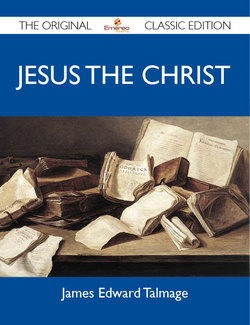Читать книгу Jesus the Christ - The Original Classic Edition - Talmage James - Страница 3
На сайте Литреса книга снята с продажи.
Оглавление1. Misunderstanding of Malachi's Prediction.--In the closing chapter of the compilation of scriptures known to us as the Old Testament, the prophet Malachi thus describes a condition incident to the last days, immediately preceding the second coming of Christ: "For, behold, the day cometh, that shall burn as an oven, and all the proud, yea, and all that do wickedly, shall be stubble: and the day that cometh shall burn them up, saith the Lord of hosts, that it shall leave them neither root nor branch. But unto you that fear my name shall the Sun of righteousness arise with healing in his wings." The fateful prophecy concludes with the following blessed and far-reaching promise: "Behold, I will send you Elijah the prophet before the coming of the great and dreadful day of the Lord: and he shall turn the heart of the fathers to the children, and the heart of the children to their fathers, lest I come and smite the earth with a curse." (Malachi 4:1, 2, 5, 6.) It has been held by theologians and Bible commentators that this prediction had reference to the birth and ministry of John the Baptist, (compare Matt. 11:14; 17:11; Mark 9:11; Luke 1:17), upon whom rested the spirit and power of[Pg 150] Elias (Luke 1:17). However, we have no record of Elijah having ministered unto the Baptist, and furthermore, the latter's ministry, glorious though it was, justifies no conclusion that in him did the prophecy find its full realization. In addition, it should be remembered, that the Lord's declaration through Malachi, relative to the day of burning in which the wicked would be destroyed as stubble, yet awaits fulfilment. It is evident, therefore, that the commonly accepted interpretation is at fault, and that we must look to
a later date than the time of John for the fulfilment of Malachi's prediction. The later occasion has come; it belongs to the present dispensation, and marks the inauguration of a work specially reserved for the Church in these latter days. In the course of a glorious manifestation to Joseph Smith and Oliver Cowdery, in the temple at Kirtland, Ohio, April 3d, 1836, there appeared unto them Elijah, the prophet of old, who had been taken from earth while still in the body. He declared unto them: "Behold, the time has fully come, which was spoken of by the mouth of Malachi, testifying that he (Elijah) should be sent before the great and dreadful day of the Lord come, to turn the hearts of the fathers to the children, and the children to the fathers, lest the whole earth be smitten with a curse. Therefore the keys of this dispensation are committed into your hands, and by this ye may know that the great and dreadful day of the Lord is near, even at the doors." (Doc. and Cov. 110:13-16.) See also The House of the Lord, pp. 82-83.
2. The Sign of the Dove.--"John the Baptist ... had the privilege of beholding the Holy Ghost descend in the form of a dove, or rather in the sign of the dove, in witness of that administration. The sign of the dove was instituted before the creation of the world, a witness for the Holy Ghost, and the devil cannot come in the sign of a dove. The Holy Ghost is a personage, and is in the form
of a personage. It does not confine itself to the form of the dove, but in sign of the dove. The Holy Ghost cannot be transformed into a dove; but the sign of a dove was given to John to signify the truth of the deed, as the dove is an emblem or token of truth and innocence."--From Sermon by Joseph Smith, History of the Church, vol. 5, pp. 260-261.
3. The Testimony of John the Baptist.--Observe that the Baptist's testimony to the divinity of Christ's mission is recorded as having been given after the period of our Lord's forty-day fast and temptations, and therefore approximately six weeks subsequent to the baptism of Jesus. To the deputation of priests and Levites of the Pharisaic party, who visited him by direction of the rulers, probably by appointment from the Sanhedrin, John, after disavowing that he was the Christ or any one of the prophets specified in the inquiry, said: "There standeth one among you whom ye know not; he it is who coming after me is preferred before me." On the next day, and again on the day following that, he bore public testimony to Jesus as the Lamb of God; and on the third day after the visit
of the priests and Levites to John, Jesus started on the journey to Galilee (John 1:19-43).
